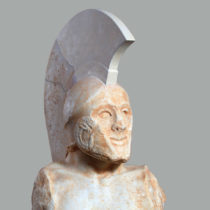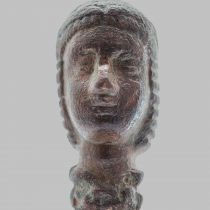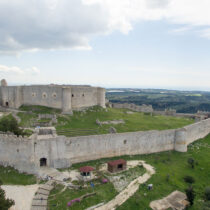Genes for nose shape found
Genes that drive the shape of human noses have been identified by a UCL-led study.
Oldest actinopterygian from China provides new evidence for origin of ray-finned fishes
Researchers used high-resolution computed tomography to re-examine the most complete remains of Meemannia, and presented new details of the internal skeleton and one of the earliest osteichthyan endocasts.
UAE burial to reveal evidence on Neolithic way of life
The bodies unearthed in a 2013 archaeological site at the UAE yield valuable information regarding funerary practices as well as identity and nation creation.
Late Antique Archaeology 2016
This conference will be a decisive step in making the late antique community aware of a whole range of environmental phenomena that affected Mediterranean and northern European societies at the end of Antiquity and the Early Middle Ages.
Burial sites show how Nubians, Egyptians integrated communities thousands of years ago
New bioarchaeological evidence shows that Nubians and Egyptians integrated into a community, and even married, in ancient Sudan, according to new research from a Purdue University anthropologist.
New horned dinosaur had spikes at back of neck shield
New Machairoceratops specimens may narrow gap in fossil record for North American centrosaurines.
King Tutankhamun’s secret chamber theory not so sure
Theory of a hidden chamber in Tutankhamun's tomb might be disproved but evidence from a new completed research has not been officially published.
Lead pollution reveals the ancient history of Naples
Geochemical analyses of sedimentary deposits in the ancient port of Naples made it possible to retrace events that took place two thousand years ago, and reconstruct the city's history.
Research finds skull condition thought extinct is actually widespread
Some forensic anthropologists thought the skull condition called cribra orbitalia (CO) was a thing of the past—but new research finds that it not only still exists, but is fairly common in both North America and South Africa.
Evolution: Building-blocks of life
Biological evolution was preceded by a long phase of chemical evolution during which precursors of biopolymers accumulated.
Sunken cities, Egypt’s lost worlds on show at the British Museum
The new exhibition presents 300 artefacts, 200 of which were discovered off the Egyptian coast in the last 20 years.
Aspects of Minoanization: New Evidence from the Northern Sector of Ayia Irini, Kea
Therefore, this paper utilizes current theoretical trends in the interpretation of cultural change and contact, as well as the major research efforts undertaken during the last decade at the site of Ayia Irini, in order to revisit the topic of cultural change.
Ancient Irish musical history found in modern India
An archaeologist studying musical horns from iron-age Ireland has found musical traditions, thought to be long dead, are alive and well in south India.
Roman fort built in response to the Boudica uprising discovered in London
A Roman fort, built in AD63 in direct response to the sacking of Londinium by the Queen of the native Iceni Boudica, has been discovered by MOLA in the City of London.
Spectacular cargo of ancient shipwreck found in Caesarea
Israel Antiquities Authority archaeologists diving in the ancient harbor in the Caesarea National Park recovered beautiful artifacts and coins from a 1,600-year-old shipwreck.
Textiles & Identity in the Medieval and Εarly Modern Mediterranean
BSA workshop hosted by the Museum of Islamic Art (Benaki).
Stater 360°: An interactive system for the presentation of ancient coins
An interactive application, original worldwide, which consists mainly of a rotating metal disc on which twenty coins are represented.
Charioteers in the sanctuary of Poseidon at Onchestos
According to Apollodorus and Pausanias, even prior to the Trojan war, chariot races took place in Onchestos in honour of Poseidon. Is this perhaps related to a pair of bronze masterpieces that adorn the National Archaeological Museum?
Florida archaeological site yields clues to early civilization in southeast US
The discovery of stone tools alongside mastodon bones in a Florida river shows that humans settled the southeastern United States as much as 1,500 years earlier than scientists previously believed.
Archaeologists uncover bones of ancient, extinct species of bison
Bison antiquus, sometimes referred to as the “ancient bison,” was the most common large herbivore of the North American continent for more than 10,000 years.
Skull specializations allow bats to feast on their fellow vertebrates
Biologists are shedding light on how so-called “carnivorous bats” adapted to the daunting task of chowing down their backboned prey.
Climate change may have contributed to extinction of Neanderthals
Neanderthals in Europe showed signs of nutritional stress during periods of extreme cold, suggesting climate change may have contributed to their demise around 40,000 years ago, according to recent study.
Researchers prove humans in Southern Arabia 10,000 years earlier than first thought
New evidence shows that there was an Ice Age refugium in Arabia, possibly on the Red Sea plains, and that the people dispersed and populated Arabia and the Horn of Africa.
New archaeological method finds children were skilled ceramists during the Bronze Age
Artisanal interpretation of ceramics from the Bronze Age shows that a nine-year-old child could be a highly skilled artisan. This was one of the discoveries presented in a new thesis from Lund University in Sweden.




























